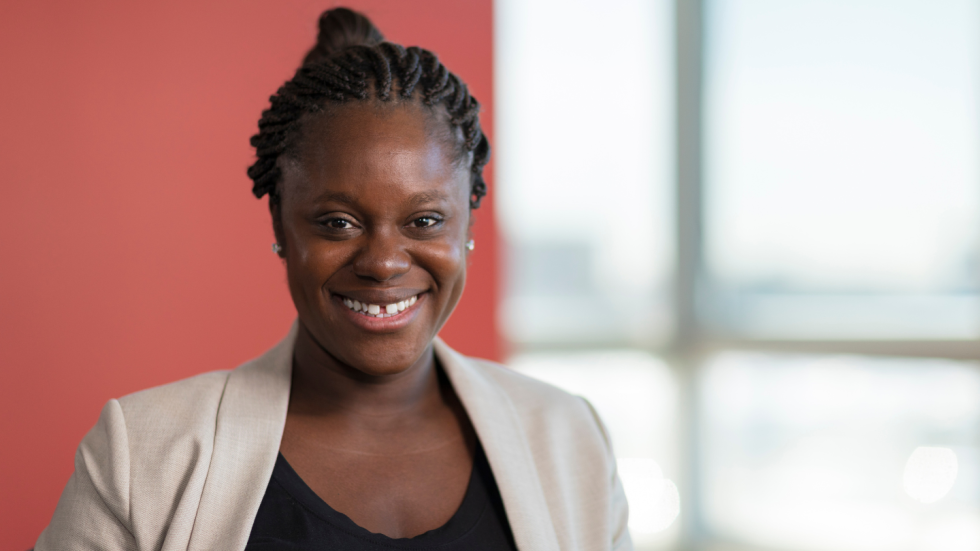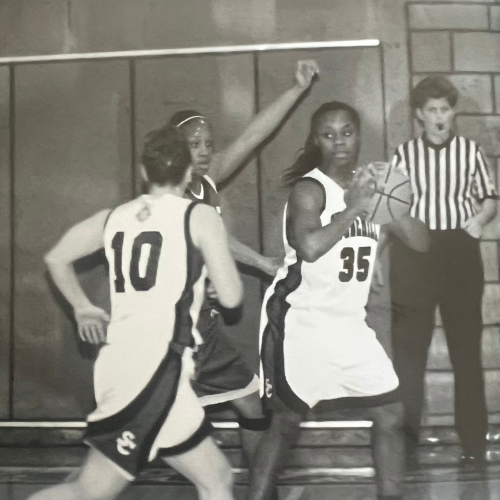
Alisha Collins '07
Five Questions with Alisha Collins '07
From the court to the community, Collins continues to lead with the same Stonehill spirit that shaped who she is today.
When Alisha Collins ’07 began her college search as a star student-athlete, she pictured herself heading south of the Northeast—somewhere new, somewhere far from her home in Port Chester, NY. That all changed when she stepped foot on Stonehill’s campus. Its beauty, the warmth of the community and the energy of student life captivated her from the start. What once felt “too close to home” suddenly became the place she couldn’t imagine leaving.
Some moments as a Skyhawk never left Collins. Spring Weekend of her first year—Maroon 5 performed live at Stonehill, their hit song “This Love” echoing across campus. Four seasons of women’s basketball—she dribbled with skill, determination and a love for the game. Inducted into the Athletics Hall of Fame in 2022, she still cheers on the program and her former head coach, Trisha Brown, at games, an experience she says feels like “coming home.” Convocation, senior year—she received her Stonehill pin to begin her final year, a tradition she proudly revisited as an alumna when she carried a banner in 2023 for the College’s 75th anniversary.
Today, Collins brings her daughter to ride her bike along the same winding paths she once walked as a student, grateful for how her time at Stonehill shaped who she is. In five questions, she discusses her role as director of strategic workforce development at National Grid, how her student-athlete experience influenced her leadership style and why staying connected to the College matters to her.
Your career has centered on community impact and engagement. What first drew you to this kind of work, and how did your path lead you to your current role at National Grid?
When I was a freshman, I remember there being a day of service called Into the Streets. I went out to a senior center in Brockton to bake cookies and help spruce up the outdoor area for the residents. It was a great reminder that while you’re here for your four years of school, you’re also joining a larger community. On campus, things might feel plentiful, but that’s not always the case for those around you. That experience really resonated with me—it showed me that I could do great work that suited my skill set while also giving back in a thoughtful way.
My career has really centered around that idea of community impact, philanthropy and engagement. When I joined National Grid in 2023, I led our New England strategy for charitable giving and volunteerism, connecting our 7,000 employees to different opportunities and even helping place leaders on nonprofit boards. This past May, I stepped into my current role leading our workforce development strategy.
As the director of strategic workforce development, you’re responsible for shaping strategic efforts to upskill and train community members, empowering them to pursue career opportunities at National Grid. What part of this work has been most rewarding for you?
What’s been most meaningful is the opportunity to really make an impact for community members who are looking to be gainfully employed and start lasting careers. The team I have the pleasure of leading curates thoughtful experiences for a wide range of people—high school students in their junior or senior years, first-year and first-generation college students and adults who may have been in the workforce but haven’t yet found that role that allows them to grow. Helping them connect to a mission-driven organization like National Grid and see a future for themselves here has been incredibly rewarding.
My time as a women’s basketball student-athlete is what grounds me today. There’s a built-in community within the program that keeps me coming back to cheer on the team. Even though campus has changed tremendously since I left, it still feels like coming home.
As a former Stonehill women’s basketball player, what lessons from your student-athlete experience still influence your approach to leadership and collaboration today?
The top thing that stands out is preparation. In athletics, that means understanding your opponent; in my work, it’s understanding your stakeholders. In this role, I’m constantly thinking about both the external environment—our training partners and potential candidates—and our internal stakeholders, the champions who make hiring decisions for the people coming through our programs. That sense of preparation, collaboration and team dynamic runs deep in how I lead every day. I’m not just a single contributor; a lot of my work shows up in a coaching mindset—directing, guiding and making sure I’ve assembled the right team to execute on the plan, while also being ready to pivot and adjust when needed.
And of course, I’m competitive. I want to win, and I want my team to win, too. My time as a women’s basketball student-athlete is what grounds me today. There’s a built-in community within the program that keeps me coming back to cheer on the team. Even though campus has changed tremendously since I left, it still feels like coming home.
Why is building a strong, inclusive workforce such an important focus for you at National Grid?
We serve a diverse customer base across New England at National Grid, so it’s really important that our workforce reflects the vibrancy of the communities where our customers live, work and play. In my role, I get to directly tap into the talent that exists across our footprint and introduce people to National Grid—people who may know us as their utility provider but haven’t yet seen themselves as part of our mission. Now, they have the opportunity to help power that mission forward. As we often say here, we’re building tomorrow’s workforce today, and that’s such a key pillar of our company’s success. I take that responsibility seriously, but I also feel an incredible sense of honor in helping shape what the future workforce of National Grid will look like.
You’re a member of Stonehill’s President’s Advisory Council. What motivates you to give back to Stonehill in this way, and what does staying connected to the College mean to you?
It’s such an interesting position to hold because you get to lift the hood a bit and see what’s guiding Stonehill into its future—how the College thinks about the evolution of today’s student and how they show up in the world. Having a seat at the table to share my perspective, especially from what I’m seeing in the workforce, feels really meaningful because at the end of the day, we want our students to leave Stonehill ready to thrive in their careers. It’s also been a wonderful networking experience for me; the Council brings together alumni from different generations, each with their own reasons for giving back, yet we all share a common appreciation for how Stonehill shaped our values, relationships and approach to life beyond campus. It’s been great to be part of that community and to support Father Denning’s mission for the College.
Collins (right) and Marie Kelly '00 (left) at Convocation in 2023.

